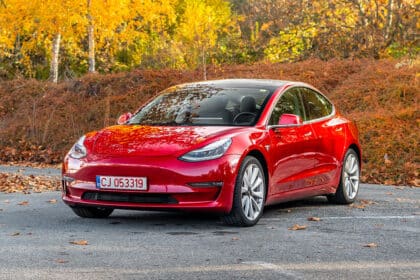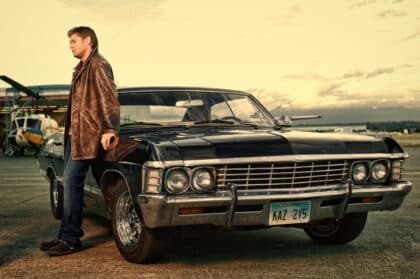
Funny, breezy and packed with fascinating insights about American culture, Don’t Make Me Pull Over hits the highway for a whirlwind trip through a post-World War II era when the family road trip reigned supreme. In this book, Richard Ratay seamlessly integrates cultural history and humorous memories of his own family trips. It’s an approach that’s sure to bring back memories for older readers — and give younger readers a vivid feel for that bygone time before ever-present smartphones and affordable airfare.
Product Details: Hardcover, 272 pages
Retail Price: $27.00
Publication Date: July 3, 2018
ISBN: 978-1-5011-8874-9
Publisher: Scribner
Tire Tips: How to take care of them and when to replace them

Photo: Simon & Schuster
Once the automobile was invented, it didn’t take long for Americans to fill the roads en route to faraway destinations. But it wasn’t until the development of the interstate highway system in the 1950s that road travel became relatively fast and painless. According to Ratay, “Postwar Americans had fat wallets, new cars, paid time off from work, the curiosity to see new places, and lots of kids with whom to share the experience.” With the development of interstates, they could easily get on the highway and see the country.
Ratay takes a topical approach to his subject, covering a different aspect of family road tripping in each chapter. After setting the overarching historical scene, he delves deeper, examining the growth of national motel chains and drive-thrus, the development of the roadside attraction and the rest stop, the history of the station wagon, the story of the 55 mph speed limit, the slow adoption of seat belts and safety precautions, and other components of the postwar road-trip experience.
Buying Used? Find the best car for your needs with these tips
Ratay intercuts all this with hilarious scenes from his childhood, which he spent crisscrossing the eastern U.S. on family vacations with his father, mother, and three older siblings. As the youngest kid in the car, Ratay roamed around without a seat belt or perched on the rear window ledge, whiled away the hours with Madlibs and electronic football, and eagerly awaited the wonders of the hotel video game arcade. The book’s biggest laughs come from Ratay’s larger-than-life dad, who loved big, luxurious cars almost as much as he hated stopping for food or bathroom breaks.
In Ratay’s telling, these long hours of family travel involved plenty of wrong turns, boredom, frustration, and sibling squabbles — especially without electronic devices to pass the time or pinpoint the location of the next rest stop, McDonald’s, or hotel. However, they were also occasions for bonding as a family, creating unforgettable memories, and developing a sense of curiosity and wonder while surrounded by the unknown.
By the time Ratay hit his teenage years in the 1980s, though, the golden age of family road trips was beginning to diminish — done in by newly cheap airplane tickets, technological devices that reduced family togetherness, and increasingly safe and standardized travel conditions.
Today, apps and navigation are available to plan every step of a road trip, endless electronic diversions shorten long journeys, and vehicles are safer and more reliable than ever. It’s difficult to envision an era when a road atlas or AAA TripTik was the only guide to unfamiliar territory, seat belts were optional, and every mile held the possibility of discovery.
Don’t Make Me Pull Over’s look back at these fast-fading decades of American history offers an amusing yet thoughtful look at what we’ve gained and lost since then — and a reminder that we can still find ways to savor our journeys as much as we do our destinations.
Don’t Make Me Pull Over is available through the publisher, Amazon, and other booksellers.
A longtime editor/writer and recently transplanted Hoosier, Caleb Cook lives in Xenia, Ohio. His favorite activities are reading and listening to music, although he occasionally emerges from the heap of books and vinyl records in his basement to stand blinking in the sunlight. Once fully acclimated to the outside world again, he can be observed hanging out with his wife, attempting a new recipe in the kitchen, attending movies, walking the dog, or wandering into a local brewery to inquire about what’s on tap. See more articles by Caleb.









